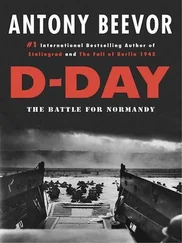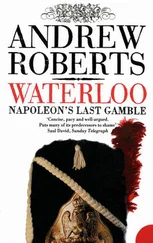WATERLOO
June 18, 1815:
The Battle for Modern Europe
ANDREW ROBERTS
MAKING HISTORY
Series Editors: Amanda Foreman and Lisa Jardine

NEW YORK • LONDON • TORONTO • SYDNEY
FOREWORD
The Duke of Wellington described the English victory at the battle of Waterloo as ‘a damned nice thing — the nearest run thing you ever saw in your life’. As Andrew Roberts makes vividly clear in this gripping new account of the action leading up to and during the fateful battle of 18 June 1815, throughout that day the military advantage swung vertiginously towards and then away from Wellington’s forces as the battle raged. The loss of life on both sides was devastating — this was a battle in which in some senses both sides could be termed the losers. In the end, though, the victory and the lasting glory deservedly fell to Wellington.
The outcome of the battle marked a crucial and lasting juncture in European history. Napoleon Bonaparte’s defeat at Waterloo was his final downfall and the end of his imperial dream. Wellington’s victory marked the beginning of a new English imperial adventure.
The battle of Waterloo, then, was one of those milestones in history — a marker, a turning point, an epoch-making incident, a directional laser-beam of light from the past to the future — on which our understanding of the past depends. Andrew Roberts’s sharply-focused and economical account highlights the extraordinary way in which events on the ground at key moments in history shape forever what follows.
Waterloo launches an exciting series of small books edited by Amanda Foreman and Lisa Jardine — ‘Making History’— each of which covers a ‘turning point’in history. Each book in the series will take a moment at which an event or events made a lasting impact on the unfolding course of history. Such moments are of dramatically different character: from the unexpected outcome of a battle to a landmark invention; from an accidental decision taken in the heat of the moment to a considered programme intended to change the world. Each volume of ‘Making History’ will be guaranteed to make the reader sit up and think about Europe’s and America’s relationship to their past, and about the key figures and incidents which moulded and formed its process.
Amanda Foreman
Lisa Jardine
INTRODUCTION
‘AFTER THE PUBLICATION of so many accounts of the battle of 18 June, it may be fairly asked on what grounds I expect to awaken fresh interest in a subject so long before the public.’ Those words were written by Sergeant-Major Edward Cotton of the 7th Hussars as long ago as 1849, in his preface to a guidebook to the battlefield entitled A Voice from Waterloo. True enough then, how much more true are they when applied to yet another book on the battle published a century and a half and over one hundred books later. The answer that Cotton gave then is the one I would also give today: that while there are still doubts, mysteries, debates and confusions about the battle — let alone tremendous national bias evident in its retelling — there is always scope for another account.
‘Never was a battle so confusedly described as that of Waterloo,’ wrote the Swiss historian (and Marshal Ney’s chief of staff) General Henri Jomini, and that is partly because it was such a momentous engagement. The Duke of Wellington himself likened the description of a battle to that of a ball — perhaps he had in mind the Duchess of Richmond’s famous one three days before Waterloo — where there is so much simultaneous movement of so many people across so large an area with so many different outcomes that to record it all from a single standpoint becomes nigh-impossible.
Yet what we can say for certain about the battle of Waterloo — that it ended forever the greatest personal world-historical epic since that of Julius $$ — is easily enough to drive us on to want to discover more. The political career of Napoleon Bonaparte, that master of continental Europe whose life was nonetheless punctuated by the three islands on which he was born, was exiled and died, came to a shuddering and total halt on the evening of Sunday, 18 June 1815. The Grande Armée which he had led across the sands of Egypt, the meadows of Prussia, the plains of Iberia, the hamlets of Austria and the snows of Russia, was finally and completely routed on the slopes of Mont St Jean twelve miles south of Brussels.
Of course Waterloo did not spell the end of the entire Bonapartist epic — that did not take place until Napoleon’s great-nephew the Prince Imperial was speared to death by Zulu assegais in 1879 — but it did condemn the Emperor Napoleon I to ignominious exile and a subsequent early death on the Atlantic rock of St Helena. It also finally brought to an end no fewer than twenty-three almost unbroken years of French Revolutionary and subsequently Napoleonic Wars, and ushered in a period of peace in Europe that was to last — with a few short if sharp exceptions — for a century, until those self-same Low Countries fields were churned up once more with the mud and blood consequent upon similar hegemonic European ambitions.
What Lord Byron disapprovingly called ‘the crowning carnage, Waterloo’, and Alfred, Lord Tennyson, with more reverence in his panegyric poem to Wellington, ‘that world-earthquake, Waterloo!’, brought the eighteenth century to a full stop, or rather to a final exclamation mark. Despite taking place one-seventh of the way into the calendar nineteenth century, Waterloo was nonetheless essentially an eighteenth-century phenomenon. Historians sometimes write of ‘the long’ eighteenth century, a period starting with the English revolution of 1688 and ending in 1815, and it is right to see Waterloo as the end of both a geopolitical and a military era.
Ghastly as the carnage at Waterloo undoubtedly was, thenceforth wars were to be fought with the infinitely more ghastly methods of trenches (the Crimea), barbed wire, railways and machine-guns (the American Civil War), directed starvation (the Franco-Prussian War), concentration camps (the Boer War), and mustard gas and aerial bombardment (the First World War). 1By the time of the Great War, chivalry was effectively dead as an element of war-making.
By contrast with today, when an enemy head of state constitutes a legitimate military target, Wellington refused an artillery officer under his command permission to fire his battery at Napoleon. The gorgeously-coloured uniforms worn in the Napoleonic Wars were replaced, by the time of the Boer War, with khaki and subsequently camouflaged uniforms, as troops sought to blend in with the surrounding country rather than bedazzle their enemies. For all that Waterloo was, like all battles, essentially about bringing death and maiming to the enemy, there was also a tangible spirit of élan, esprit, éclat and — at least initially — aesthetic beauty to the scene.
There was also plenty of chivalry shown on both sides at Waterloo; witness the reaction of the British infantry during the great French cavalry attack when, according to Ensign Howell Rees Gronow of the 1st Foot Guards:
Among the fallen we perceived the gallant colonel of the hussars lying under his horse, which had been killed. All of a sudden two riflemen of the Brunswickers left their battalion, and after taking from their helpless victim his purse, watch, and other articles of value, they deliberately put the colonel’s pistols to the poor fellow’s head, and blew out his brains. ‘Shame!’’ Shame!’ was heard from our ranks, and a feeling of indignation ran through the whole line. 2
Читать дальше
Конец ознакомительного отрывка
Купить книгу












